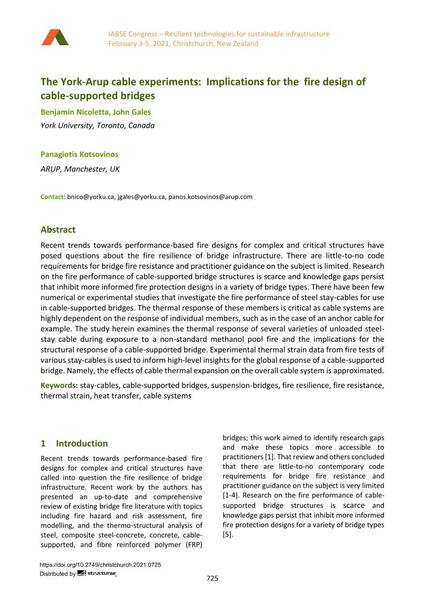The York-Arup cable experiments: Implications for the fire design of cable-supported bridges

|
|
|||||||||||
Bibliografische Angaben
| Autor(en): |
Benjamin Nicoletta
(York University, Toronto, Canada)
John Gales Panagiotis Kotsovinos |
||||
|---|---|---|---|---|---|
| Medium: | Tagungsbeitrag | ||||
| Sprache(n): | Englisch | ||||
| Tagung: | IABSE Congress: Resilient technologies for sustainable infrastructure, Christchurch, New Zealand, 3-5 February 2021 | ||||
| Veröffentlicht in: | IABSE Congress Christchurch 2020 | ||||
|
|||||
| Seite(n): | 725-728 | ||||
| Anzahl der Seiten (im PDF): | 4 | ||||
| DOI: | 10.2749/christchurch.2021.0725 | ||||
| Abstrakt: |
Recent trends towards performance-based fire designs for complex and critical structures have posed questions about the fire resilience of bridge infrastructure. There are little-to-no code requirements for bridge fire resistance and practitioner guidance on the subject is limited. Research on the fire performance of cable-supported bridge structures is scarce and knowledge gaps persist that inhibit more informed fire protection designs in a variety of bridge types. There have been few numerical or experimental studies that investigate the fire performance of steel stay-cables for use in cable-supported bridges. The thermal response of these members is critical as cable systems are highly dependent on the response of individual members, such as in the case of an anchor cable for example. The study herein examines the thermal response of several varieties of unloaded steel- stay cable during exposure to a non-standard methanol pool fire and the implications for the structural response of a cable-supported bridge. Experimental thermal strain data from fire tests of various stay-cables is used to inform high-level insights for the global response of a cable-supported bridge. Namely, the effects of cable thermal expansion on the overall cable system is approximated. |
||||
| Stichwörter: |
Wärmeübertragung Wärmeleitung Wärmetransfer Feuerwiderstand
|
||||

